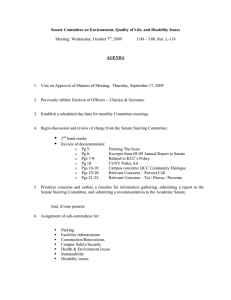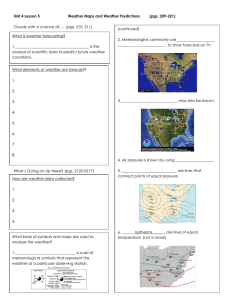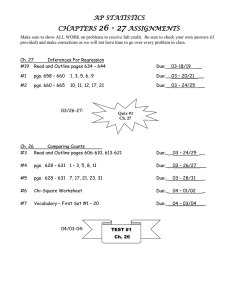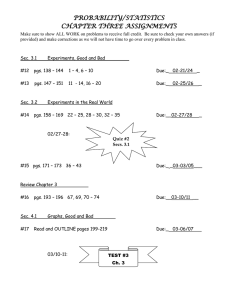ACADEMIC SENATE MINUTES April 21, 2015
advertisement
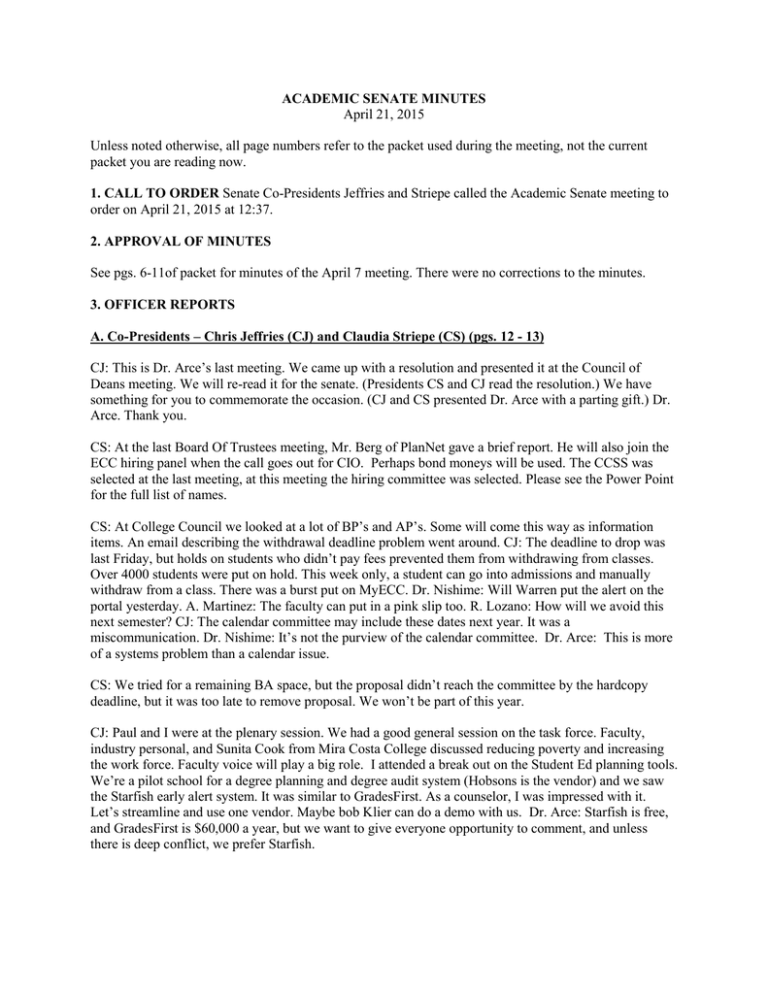
ACADEMIC SENATE MINUTES April 21, 2015 Unless noted otherwise, all page numbers refer to the packet used during the meeting, not the current packet you are reading now. 1. CALL TO ORDER Senate Co-Presidents Jeffries and Striepe called the Academic Senate meeting to order on April 21, 2015 at 12:37. 2. APPROVAL OF MINUTES See pgs. 6-11of packet for minutes of the April 7 meeting. There were no corrections to the minutes. 3. OFFICER REPORTS A. Co-Presidents – Chris Jeffries (CJ) and Claudia Striepe (CS) (pgs. 12 - 13) CJ: This is Dr. Arce’s last meeting. We came up with a resolution and presented it at the Council of Deans meeting. We will re-read it for the senate. (Presidents CS and CJ read the resolution.) We have something for you to commemorate the occasion. (CJ and CS presented Dr. Arce with a parting gift.) Dr. Arce. Thank you. CS: At the last Board Of Trustees meeting, Mr. Berg of PlanNet gave a brief report. He will also join the ECC hiring panel when the call goes out for CIO. Perhaps bond moneys will be used. The CCSS was selected at the last meeting, at this meeting the hiring committee was selected. Please see the Power Point for the full list of names. CS: At College Council we looked at a lot of BP’s and AP’s. Some will come this way as information items. An email describing the withdrawal deadline problem went around. CJ: The deadline to drop was last Friday, but holds on students who didn’t pay fees prevented them from withdrawing from classes. Over 4000 students were put on hold. This week only, a student can go into admissions and manually withdraw from a class. There was a burst put on MyECC. Dr. Nishime: Will Warren put the alert on the portal yesterday. A. Martinez: The faculty can put in a pink slip too. R. Lozano: How will we avoid this next semester? CJ: The calendar committee may include these dates next year. It was a miscommunication. Dr. Nishime: It’s not the purview of the calendar committee. Dr. Arce: This is more of a systems problem than a calendar issue. CS: We tried for a remaining BA space, but the proposal didn’t reach the committee by the hardcopy deadline, but it was too late to remove proposal. We won’t be part of this year. CJ: Paul and I were at the plenary session. We had a good general session on the task force. Faculty, industry personal, and Sunita Cook from Mira Costa College discussed reducing poverty and increasing the work force. Faculty voice will play a big role. I attended a break out on the Student Ed planning tools. We’re a pilot school for a degree planning and degree audit system (Hobsons is the vendor) and we saw the Starfish early alert system. It was similar to GradesFirst. As a counselor, I was impressed with it. Let’s streamline and use one vendor. Maybe bob Klier can do a demo with us. Dr. Arce: Starfish is free, and GradesFirst is $60,000 a year, but we want to give everyone opportunity to comment, and unless there is deep conflict, we prefer Starfish. The afternoon breakout consisted of looking at the Common Assessment Initiative. It was noted that every school must use the yet to be developed common assessment tool in order to receive SSSP monies. I also attended a very informative break out on Campus Safety and the Violence Against Women Reauthorization Act. I know Jaynie Ishikawa is working on developing a Sexual Misconduct policy and procedure and it was emphasized that this information must be disseminated in the new student orientation, so we will need to make sure that our on-line orientation has been updated to include changes in the Clery Act and the Violence Against Women Reauthorization Act. Starting July first, the focus is on the Save Act which is Campus Sexual Violence Elimination Act which increases transparency and includes dating violence, domestic violence and stalking. In addition we need to make sure we are complying to the Affirmative Consent Law which was added to California Ed Code 6386 which is basically the “yes means yes” campaign that you see going on many campuses throughout California. We had a wonderful keynote speaker at the Luncheon on Friday named Dr. Tyrone Howard from UCLA Graduate School of Education and Information. He gave a very dynamic speech on race and culture in the United States and how to close the achievement gap in America’s classroom. He has even authored a book on that subject. The final breakout session I attended was on C-ID’s, TMCs or Transfer Model Curriculums, ADTs or Associate Degrees for Transfer, AoEs or Areas of Emphasis and MCs or Model Curriculums. The last day of course revolved around all the fun resolution voting. I am still working on a synopsis of the many resolutions voted for and the few that were voted down that I will present to the Senate at our meeting next week. CJ: A link to adopted resolutions are linked in the ppt. (The algebra course issue was tabled.) CS: Continuing with our “Did You Know” series: Robert’s Rules of Order is a fixed order of business that is adhered to. (See PowerPoint for details). We had a question on motions. A motion is a proposal that the entire senate must stand or take a position on. Were including a full link to Robert’s Rules. You obtain the floor, and then make the motion in an affirmative manner. It must be seconded or it is lost. The chair can repeat it. Once made, only another motion can amend. There is a strict time limit that is adhered to also. No member may speak again, until everyone has been heard. And we observe the Brown Act, recording votes in minutes. We used to have a parliamentarian. We can revisit that position, and its release time. B. VP – Compton Education Center – Paul Flor P. Flor: I attended other breakouts at the plenary. We had a presentation on CCC budget implementation, and how prop 98 guarantees a percentage toward education. This may increase California’s debt, even if the economy improves. It was relevant to us. The resolution I’d keep an eye on is disaggregating outcome data. Under 10 + 1, and looking at equity gaps, some in attendance saw problems with faculty evaluations. The statewide senate was interested. The other of local significance is a resolution passed to credit non-local liaison positions, and legislative liaisons too. Another session, hosted by FACCC. The center is close with Jonathan Lightman. He urged me to share with you that on the FACCC website, the point and click feature highlights relevant legislation and makes it easy to wright letters to elected officials. SB 373 relates to overload assignments. If passed, July 2016 new full time faculty would be limited in ability to teach overloads, to address the 75:25 ratios. AB490 would increase EOPS and CARE funding. Since SSSP, EOPS had a 40% decrease in funds. Id’ like to share with you some upcoming events at the Center, and invite you to attend. On April 24 we host the Girls and Women in Technology conference, showcasing non-traditional careers. We’ll have representation from A/C, Refrigeration, and employers. There’s preregistration that includes a tee shirt and lunch. On May 1, there will be two workshops facilitating success for men of color, from 10:00 – 2:00 with a break for lunch. Our first planning summit was last week and we have another June 12. C. Chair – Curriculum – Mark Lipe (pgs. 14 - 15) Sand volleyball was approved along with 13 items on standard review. On pg. 15 you’ll find the changes effective in catalogue. Under NS division, with Hort. 54 there’s a comment on changing the English advisory. On college committee, for clarity reasons, and for advisories only, we will list the exact course, so students know exactly what it means. Dr. Nishime: Students who are eligible for a class based on assessment may get confused, if you don’t include a phrase such as “or appropriate assessment,” etc. M. Lipe: I’ll take that to the committee. CJ: I tell students that recs are only recs. M. Ichinaga: Did the committee look over BP4045, regarding the usual period of adoption? M. Lipe: We always want a representative textbook within a five -period. If faculty prefer an older textbook, there’s a disclaimer called “discipline standard.” D. VP – Educational Policies – A. Martinez (pgs.16) We made changes to 4045, and 5520. You can read it. It’s not terribly exciting. E. VP – Faculty Development – Kristie Daniel –DiGregorio (pgs. 17-19) Watch your email for fall Flex Day proposals. The deadline is Monday April 27th. Our theme is strengthening partnerships to support student success. We’ll have a session on early alert, sexual harassment, BOGG fee waivers. If you want to share a service you offer on campus, let us know. Please send your ideas. We’re excited to see your proposals. The collaborative proposals will be highlighted, as well as proposals those encouraging active learning. We had the On Course conference last week. Ten ECC faculty and staff attended, and some Compton folks. On May 1 we’ll have a follow up. CS: By the way, Kristie was honored as a READ poster recipient. F. VP – Finance – Lance Widman I’ll follow up Paul’s question. Under Prop 98, K - 12 will get a bigger slice. I’ll do some checking on that. G. VP – Academic Technology – Pete Marcoux Dr. Arce: On third of faculty laptops of them are reaching the expiration of their five-year warranty. Some faculty will receive upgrades. H. VP – Instructional Effectiveness/ Assessment of Learning Committee and SLO’s Update – Karen Whitney (pgs. 20 -36 ) The last ALC meetings approved minutes start on page 20. Results from a survey conducted in fall are available on p. 28. We found that people know where to go for help with SLO’s (see graph on p. 28.) On p. 36 part of Trackdat, the follow up you’ve seen the action plans. We’ve not done a lot of follow-ups in Trackdat. After talking to different divisions, its clear that they want to address this in different ways. An easier way is to complete follow up when the next course assessment is submitted. It’s anecdotal. Just a few sentences, and no further assessments are required. Decide as a division and consult your division leaders. 4. SPECIAL COMMITTEE REPORTS A. ECC VP of Academic Affairs and ECC VP of Student and Community Advancement – Francisco Arce and Jeanie Nishime. 1) ECC Bachelor Degree proposal for Respiratory Care (pgs. 37 – 52) Dr. Arce: We submitted a proposal. Our electronic copy made the deadline, but the hardcopy did not, due to a misunderstanding. It’s regrettable but next time we’ll have a solid proposal to submit. 2) Final Making Decisions Document and Summary of Planning Summit 2015 Dr. Nishime: I reviewed the document with you at a previous meeting. You’ll get a survey today to measure your understanding of our review process. We’ll have as small visiting team to see we’ve met the standards. Were on our way. The other two recommendations had to do with the Compton Center financial stability plan, and on institutional effectiveness and. There are eleven recommendations for institutional improvement, in order to better ourselves. As for strategic initiatives and selection of superintendents, that’s in place. We have Institutional effectiveness outcome measures and shared them at planning summit. (See handout.) The student readiness rate measures trends that have completed achievement, student readiness, etc. for first time, full time students. We want 100% completion rate. We have progress measures too, listed on handouts. We’ve made good progress on math, three-term persistence, and the thirty-unit achievement rate. They’re also part of the scorecard. We lost ground for completion. Even for prepared students we have a ways to go. We’ve exceeded our transfer goal. CTE completion rate are under. For Compton, they’ve exceeded their CTE completion rate. The Chancellors Office has a new effectiveness website; four more terms will be added. It’s an emphasis on accountability for everyone. C. Gold: We’ve gone down. Are our goals too ambitious? Dr. Nishime: It’s part of Board Policy 1200, which lays out the new strategic plan. So at the end of a five -year period they know. We need a target. A. Ahmadpour: How do you measure student readiness rate? Dr. Nishime: The completion of definitions on the back of the page. C. Pineda: This is a six-year cohort. B. Mitchell: How are goals selected? Dr. Nishime: Through a planning process. IR looked at data over five years and gave suggestions. It’s not too high that we can’t reach it. L. Widman: Six years seems generous. Dr. Nishime: It’s standard for tracking through the Chancellors Office. CJ: We have more part-time than full-time students. Dr. Arce. The mandatory requirement to fully matriculate has never been required before. CJ: It should increase with that total amount. M. Ichinaga: I see so many differences between different years’ performances. Are there any mitigating factors? C. Pineda: In the past we could address it, when they switched to the scorecard they took it away. Dr. Nishime: During the recession assessment our test scores went up. 5.UNFINISHED BUSINESS A. Cesar Chavez Day (CCD)/School Closure CS: We’re asked to make a recommendation to the Calendar Committee, and we gave a survey soliciting opinions. I heard that you made a second motion, Ali. A. Ahmadpour: The motion to acknowledge Cesar Chavez day as a formal holiday, with a day off. Let us acknowledge CCD as a formal holiday, with school closure, on the specific date. R. McMillan: Second. CS: You wish that the body vote that we officially recognize the day off? Dr. Nishime: the Chancellors Office require we celebrate on the date, or the Friday or Monday if it’s on a weekend. CS. Our survey asked that question. A. Ahmadpour: Many schools are subjective about this, like ELACC. It’s up to us. Dr. Nishime: Other state agencies have different authority. We’re under the Chancellor’s authority; it must be that day. R. McMillan: I think the survey is different. Ali wants a voice of full support of the holiday. A. Martinez: What I shared from Math last week showed our concerns for missing days. We’re pushing for commemoration, instead of a day off. Let’s educate students about the importance. L. Widman: Have you reported these results? I’d support an observance. I don’t want to miss more instruction. V. Palacios: I’m not against observance, but why don’t we have one day to observe everybody? Being in a classroom is a great way to honor important people. CS: This is a good thing to take to the committee. Who supports Ali’s motion to observe CCD as a formal holiday? Votes in favor: P. Lau, R. McMillan, A. Ahmadpour, M. Winfree, M. Ichinaga, K. Whitney, A. Valle, C. Gold. There were 16 nays. S. Di Fiori abstained. L. Widman: Motion to celebrate the observance of Cesar Chavez Day with appropriate activities to acknowledge his contribution to advancing the civil rights of all Americans rather than a formal holiday involving the closure of El Camino. A. Martinez: Seconded. CJ: All in favor? R. McMillan and A. Ahmadpour voted “against.” All else present voted “for.” Please See April 23 attendance for the full list of attendees. B. BP 4045 - Textbooks and Instructional Materials – C. Jeffries – (pgs. 53–54). BP 4045 has been brought back from Ed Policies with minor changes, including a paragraph regarding electronic materials; therefore this is a second reading and can be voted on today. This policy has no corresponding administrative procedures. The Union was consulted regarding this policy. Tabled because of time. C. BP/AP 4225 – Course Repetition – C. Jeffries (pgs. 55 – 64) This is the second reading of BP/AP 4225. It includes Title 5 updates including the inclusion of “families.” 6. NEW BUSINESS A. Election of Officers and Senators – Jeffries/Striepe CJ: Please address your expiring terms. M. Lipe: Allison Carr is going to be the new curriculum chair. CJ: So she will have to be voted in as a Senator for the Humanities Division. Any nominations for Ed Policies? A. Martinez: I nominate Chris Gold. C. Gold: Accepted. CJ: You’re appointed 7. INFORMATION ITEMS –DISCUSSION A. Carolyn Pineda – Changes in BOGG Fee Waivers starting Fall 16 (pgs. 65 – 90). Carolyn will return May 5. B. Elana Azose – Faculty use of GradeBook E. Azose: We want to inform you about tutorials available on GradeBook. Through ECC professional development, select the main channel. Then go to playlists, click on GradeBook. Looking forward, we’re assessing if we should spend time making these. Is this helpful? C. Gold: I was one of the four, who responded to your query. I didn’t GradeBook. It was really slow to enter grades. But it’s been years since I’ve used it. It’s easier to use the Etudes GradeBook. B. Jaffe: I’ve used it for years. I really like it. It puts responsibility on students. Now they rarely ask, “How am I doing in your class?” It’s an up the minute report on grades. But it’s labor intensive. I keep hardcopies just in case. A. Martinez: I hated it. It had programming issues. B. Jaffe: At the training they didn’t have an extra credit option. That’s good it’s offered now. 8. FUTURE AGENDA ITEMS 9. PUBLIC COMMENT 10. ADJOURN The meeting adjourned at 2:02. SD/ECC Spring/15
